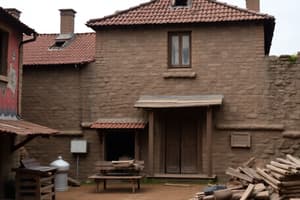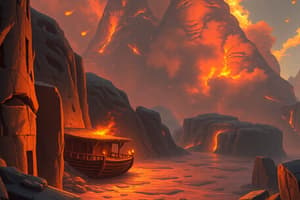Podcast
Questions and Answers
What are materials from the time period being studied called?
What are materials from the time period being studied called?
- Tertiary sources
- Secondary sources
- Quaternary sources
- Primary sources (correct)
What is the study of how history is written and interpreted called?
What is the study of how history is written and interpreted called?
- Historiography (correct)
- Paleontology
- Archaeology
- Anthropology
Which of the following involves understanding the causes and effects of historical events?
Which of the following involves understanding the causes and effects of historical events?
- Continuity
- Context
- Significance
- Causation (correct)
What type of system was Feudalism in medieval Europe?
What type of system was Feudalism in medieval Europe?
Which period saw the rise of nation-states, the Age of Exploration, and the Scientific Revolution?
Which period saw the rise of nation-states, the Age of Exploration, and the Scientific Revolution?
Which economic system is characterized by private ownership of the means of production and free markets?
Which economic system is characterized by private ownership of the means of production and free markets?
What is the belief that a rule, institution, or leader has the right to govern called?
What is the belief that a rule, institution, or leader has the right to govern called?
What kind of upheaval can spark revolutions?
What kind of upheaval can spark revolutions?
What does social history primarily examine?
What does social history primarily examine?
Judging the past by present-day standards is known as what?
Judging the past by present-day standards is known as what?
Flashcards
Primary Sources
Primary Sources
Materials from the time period being studied, offering firsthand accounts or evidence.
Secondary Sources
Secondary Sources
Interpretations and analyses of primary sources, providing commentary or analysis.
Historiography
Historiography
The study of how history is written and interpreted, and how perspectives can vary.
Causation
Causation
Signup and view all the flashcards
Change and Continuity
Change and Continuity
Signup and view all the flashcards
Historical Context
Historical Context
Signup and view all the flashcards
Significance
Significance
Signup and view all the flashcards
Mercantilism
Mercantilism
Signup and view all the flashcards
Capitalism
Capitalism
Signup and view all the flashcards
Revolutions
Revolutions
Signup and view all the flashcards
Study Notes
- Studying history involves understanding past events, their contexts, and their impact on the present
Historical Sources
- Primary sources are materials from the time period being studied, such as documents, artifacts, and personal accounts
- Secondary sources interpret and analyze primary sources, offering commentary and analysis
- Evaluating sources involves considering the author's perspective, potential biases, and the context in which the source was created
- Oral traditions, though valuable, can change over time and may be less reliable than written records
Historiography
- Historiography is the study of how history is written and interpreted
- Different historical perspectives and schools of thought can lead to varying interpretations of the same events
- Historians must be aware of their own biases and strive for objectivity in their research and writing
Research Methods
- Historical research involves formulating a research question, gathering sources, analyzing evidence, and constructing an argument
- Proper citation and attribution are essential to avoid plagiarism and give credit to the original authors
Key Historical Concepts
- Causation involves understanding the causes and effects of historical events, recognizing that events often have multiple causes
- Change and continuity refer to the ways in which societies and cultures evolve over time, while retaining certain elements of the past
- Context involves understanding the social, political, economic, and cultural factors that shaped historical events
- Significance involves evaluating the importance and lasting impact of historical events
Ancient Civilizations
- Ancient civilizations arose in various parts of the world, including Mesopotamia, Egypt, the Indus Valley, and China
- These civilizations developed complex social structures, writing systems, and technological innovations
- Factors such as environment, trade, and conflict influenced the development and decline of ancient civilizations
- The legacies of ancient civilizations can still be seen in modern societies
Classical Civilizations
- Classical civilizations, such as Greece and Rome, made significant contributions to philosophy, politics, art, and literature
- Greek democracy and Roman republicanism influenced the development of Western political thought
- The rise and fall of classical civilizations were shaped by factors such as internal conflicts, external invasions, and economic changes
- The cultural achievements of classical civilizations continue to inspire and influence modern societies
Medieval Period
- The medieval period, also known as the Middle Ages, followed the decline of the Roman Empire
- Feudalism and manorialism were dominant social and economic systems in medieval Europe
- The Catholic Church played a central role in medieval society, influencing politics, culture, and education
- The Crusades and the Renaissance were major events that transformed medieval Europe
Early Modern Period
- The early modern period witnessed the rise of nation-states, the Age of Exploration, and the Scientific Revolution
- The Protestant Reformation challenged the authority of the Catholic Church and led to religious conflicts
- The Enlightenment emphasized reason, individualism, and human rights, influencing political and social reforms
- European colonialism and imperialism had a profound impact on societies around the world
Modern Period
- The modern period has been marked by industrialization, urbanization, and globalization
- The French Revolution and other revolutions sought to overthrow existing political structures and establish new forms of government
- The two World Wars and the Cold War shaped the 20th century, leading to significant political and social changes
- Technological advancements have transformed human societies and created new challenges and opportunities
Economics
- Mercantilism was an economic theory and practice, dominant in Europe from the 16th to the 18th century, that promoted governmental regulation of a nation's economy for the purpose of augmenting state power at the expense of rival national powers
- Capitalism is an economic system characterized by private ownership of the means of production, free markets, and the pursuit of profit
- Socialism is an economic and political system in which the means of production are owned or controlled by the community as a whole
- Communism is a political and economic ideology that advocates for a classless society in which all property is publicly owned and each person works and is paid according to their abilities and needs
Politics and Power
- Power can be applied at multiple levels, state, regional to communal
- Authority is the legitimate use of power
- Legitimacy is the belief that a rule, institution, or leader has the right to govern
Revolutions
- Revolutions are transformative processes
- They can occur due to political, social, or economic upheaval
- Revolutions often involve violence and regime change
- Revolutions can lead to lasting societal transformations
Social and Cultural History
- Social history examines the lives and experiences of ordinary people in the past
- Cultural history explores the ideas, beliefs, and values of different societies
- Gender, race, class, and other social categories shape historical experiences
- Art, literature, music, and other forms of cultural expression reflect and influence historical events
War and Conflict
- Warfare has been a recurring feature of human history
- Causes of war include territorial disputes, economic competition, and ideological differences
- War can have devastating consequences for individuals, societies, and the environment
- Efforts to prevent war and promote peace have been a constant theme in human history
Global Interactions
- Trade, migration, and cultural exchange have connected different parts of the world for millennia
- Colonialism and imperialism led to the exploitation and domination of many societies by European powers
- Globalization has accelerated the pace of interconnectedness in recent decades
- Global challenges such as climate change, pandemics, and economic inequality require international cooperation
Research and Writing
- Formulate a clear research question
- Gather relevant primary and secondary sources
- Analyze evidence critically and objectively
- Construct a well-supported argument
- Cite sources properly to avoid plagiarism
- Write in a clear, concise, and engaging style
- Revise and edit your work carefully
Understanding Historical Context
- Examine the political, social, economic, and cultural conditions of the time
- Consider the perspectives and motivations of different individuals and groups
- Recognize that historical events are often complex and multifaceted
- Avoid presentism, which is the tendency to judge the past by present-day standards
Developing Historical Thinking Skills
- Analyze primary and secondary sources
- Evaluate different interpretations of historical events
- Identify cause-and-effect relationships
- Understand the significance of historical events
- Communicate historical knowledge effectively
Studying That Suits You
Use AI to generate personalized quizzes and flashcards to suit your learning preferences.




